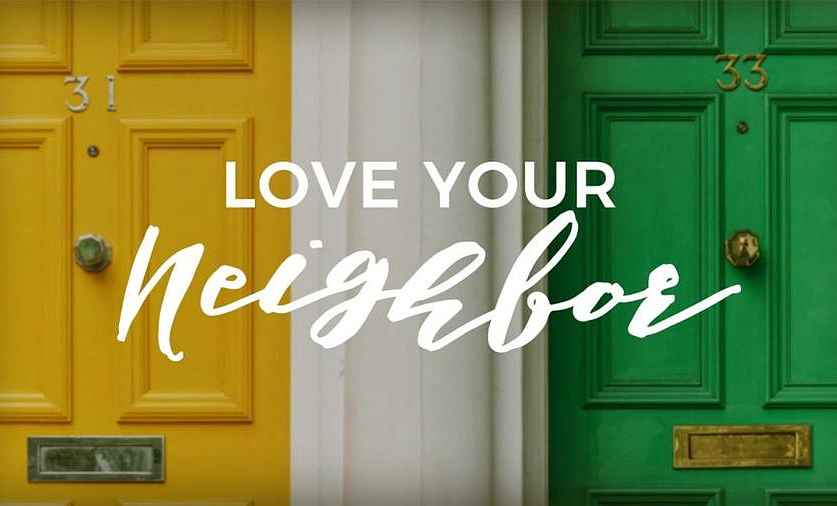






See listing of Recent and Most Popular articles on the Home Page
Connections
Category: Relationships / Topics: Attitudes • Love • Relationships • Religion
What 'Love Your Neighbor' Means
by Ken Potts
Posted: February 6, 2021
We need to assess our attitude…
Most of us grew up with the religious commandment to "love your neighbor." We heard about going the second mile, or giving the shirt off our backs. We were told that love is gentle, understanding, patient, forgiving, etc.
Loving is a tall order.
Loving is tough even when we just try using it in our day-to-day encounters with friends, family, and acquaintances.
We weren't told how to love little Billy down the block who thought it was great fun to push us into a mud puddle. Nor were we educated in the fine art of loving the older kid who stole our bicycle.
We soon discovered that, despite our religious training and the expectations of our parents, the "love your neighbor" bit was a standard we seemed to seldom live up to.
And, we soon realized that our religious teachers, parents, and friends couldn't do much better than we could. It became apparent that loving those around us was a pleasant idea, but best spoken piously and then forgotten.
Maybe we can do better than that. I sometimes wonder if we don't need to change our notion of just what such love is.
We usually think of love as an emotion -- a warm, fuzzy, tender feeling that can bring joy to our hearts and tears to our eyes. And, quite frankly, the chances of our having such a feeling about the guy who just dented our car, or the woman whose dog just used our yard as a toilet, is rather slim.
But there is another type of love that has more to do with the "love your neighbor" commandment we often struggle with. Such a love is much more an attitude than a feeling. It is a way of viewing other people that transcends our emotions and ultimately dictates our behavior.
Let me give you an example.
The other day I walked into one of the local phone stores to return a cellphone. A clerk seemed to be doing her best to ignore me; but finally, in a depressed, surly tone, she asked me what I wanted.
My first inclination was to respond to her in the same vein. But then I realized, here in front of me, was a person who was obviously hurting. She may have had a fight with her husband, just come down with a cold, or been struggling with a job she needed but didn't like.
Whatever the reason, her rudeness to me was simply a reflection of her own inner pain or frustration.
There wasn't anything about this person that was particularly lovable. In fact, she was downright annoying. Yet, I could display a loving attitude in responding to her.
As we completed our business, I intentionally smiled and said gently, "I hope your day gets better." I got a brief and weak smile in return.
I certainly didn't feel any love in this situation. I was, however, able to let my loving attitude, rather than my annoyed and somewhat angry feelings, dictate my behavior.
Now, don't get me wrong. I don't think there's anything easy about responding in love to a person who is rude or inconsiderate. And I mess up as much as anybody else. But we can at least all try.
To show the attitude called love, then, means:
- Reining in our tendency to automatically give back what we just got;
- Listening with an extra bit of understanding and trying to put ourselves in other people's shoes; and
- Using our loving attitude to govern our response rather than our hurt, angry or frustrated feelings.
Such an attitude probably won't solve all the world's problems. But I do think developing the attitude called love, and letting it govern our day-to-day living, does allow us to "love our neighbor" despite the fact that all of us are, now and then, pretty unlovable.
It is something we actually can do, and the sooner the better.
Search all articles by Ken Potts
Dr. Ken Potts is on the staff of SamaraCare Counseling Center in Naperville and Downers Grove, Illinois. • E-mail the author (gro.gnilesnuoceracaramas@sttopk*) • Author's website (personal or primary**)* For web-based email, you may need to copy and paste the address yourself.
** opens in a new tab or window. Close it to return here.
Posted: February 6, 2021 Accessed 310 times
![]() Go to the list of most recent Connections Articles
Go to the list of most recent Connections Articles
![]() Search Connections (You can expand the search to the entire site)
Search Connections (You can expand the search to the entire site)
![]() Go to the list of Most Recent and Most Popular Articles across the site (Home Page)
Go to the list of Most Recent and Most Popular Articles across the site (Home Page)
 Loading requested view...
Loading requested view...